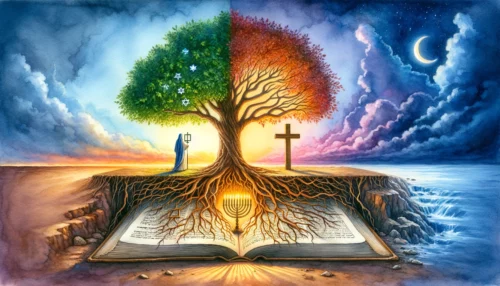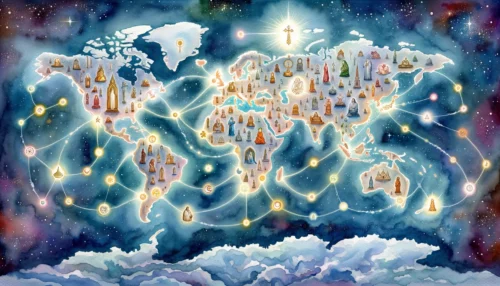It’s a question that has sparked curiosity and sometimes controversy among believers and non-believers alike – are Jehovah’s Witnesses considered Christians? To answer this question, we’ll examine the core beliefs and practices of Jehovah’s Witnesses, compare them to traditional Christian teachings, and ultimately shed light on the similarities and differences between the two. Join us on this journey to gain insight into the faith of Jehovah’s Witnesses and their unique take on Christianity.
Origins and Beliefs of Jehovah’s Witnesses
Jehovah’s Witnesses is a denomination that originated in the United States in the late 19th century. Charles Taze Russell, the founder of the movement, was a Bible student who sought to understand the Scriptures from a fresh perspective. He began publishing a magazine called “Zion’s Watch Tower and Herald of Christ’s Presence” in 1879, which later evolved into the Watchtower Society, the organization behind Jehovah’s Witnesses today.
One of the key beliefs of Jehovah’s Witnesses is their strict monotheism, which emphasizes the belief in Jehovah (Yahweh), the God of the Old Testament, as the one true God. They believe that Jesus Christ is not God but rather God’s firstborn son and the Messiah (John 1:1, 14; Colossians 1:15). They also teach that the Holy Spirit is not a person, but God’s active force or energy that he uses to accomplish his will (Acts 2:17-18).
Jehovah’s Witnesses hold to the belief that God’s kingdom was established in heaven in 1914, with Jesus as its king. They believe that this marked the beginning of the “last days” of human history, a period leading up to the Battle of Armageddon, where God will destroy wickedness and establish a new earthly paradise (Revelation 16:14-16; 21:1-4). Only Jehovah’s Witnesses who remain faithful and obedient to God’s teachings will be granted salvation and eternal life in this paradise.
Another key belief is their insistence on using the name “Jehovah” for God. They argue that by restoring the use of God’s name in their teachings and worship, they are honoring and distinguishing the true God from the false gods of other religions (Exodus 3:15; Isaiah 42:8).
Regarding the Bible, Jehovah’s Witnesses view it as the inspired word of God and the ultimate authority for their beliefs and practices. They use their own translation, the New World Translation of the Holy Scriptures, which they believe more accurately reflects the original texts.
Jehovah’s Witnesses are known for their door-to-door evangelism, and they believe that sharing their faith is an essential part of their worship. They also refuse to participate in certain activities that they consider incompatible with their faith, such as voting, military service, and celebrating holidays and birthdays (John 17:16; 2 Corinthians 6:14-18).
The beliefs and practices of Jehovah’s Witnesses set them apart from mainstream Christianity in several ways. They have a distinct understanding of God, Jesus, and the Holy Spirit, as well as unique views on salvation, the end times, and the role of God’s name in worship. In the next section, we’ll compare these beliefs to those of traditional Christianity to determine whether Jehovah’s Witnesses can be considered part of the Christian faith.
Comparing Jehovah’s Witnesses and Traditional Christianity
When comparing the beliefs of Jehovah’s Witnesses with traditional Christianity, it is essential to focus on the core doctrines that define the Christian faith. These doctrines include the nature of God, the person of Jesus Christ, and the role of the Holy Spirit.
The nature of God is a fundamental difference between Jehovah’s Witnesses and traditional Christianity. Jehovah’s Witnesses adhere to strict monotheism, recognizing only Jehovah as the one true God. In contrast, mainstream Christianity teaches the doctrine of the Trinity, which asserts that God exists in three persons – Father, Son, and Holy Spirit – who are co-equal and co-eternal (Matthew 28:19; 2 Corinthians 13:14).
The person of Jesus Christ is another area of divergence. Jehovah’s Witnesses believe that Jesus is God’s firstborn son and the Messiah, but not God himself. They teach that Jesus was a created being, subordinate to God the Father (John 1:1, 14; Colossians 1:15). Traditional Christianity, on the other hand, affirms the deity of Christ, teaching that he is both fully God and fully human, and co-equal with the Father and the Holy Spirit (John 1:1, 14; Philippians 2:5-11).
The role of the Holy Spirit is also distinct between the two belief systems. Jehovah’s Witnesses view the Holy Spirit as an impersonal force or energy that God uses to accomplish his will (Acts 2:17-18). In traditional Christianity, the Holy Spirit is considered the third person of the Trinity, possessing personal attributes and actively involved in the lives of believers (John 14:16-17; Romans 8:26-27).
Salvation is another area of significant difference. Jehovah’s Witnesses believe that salvation is granted only to faithful and obedient members of their organization, while traditional Christianity teaches that salvation is by grace through faith in Jesus Christ alone, and not dependent on works or belonging to a specific denomination (Ephesians 2:8-9; John 3:16).
While there are some similarities between Jehovah’s Witnesses and traditional Christianity, such as their belief in the Bible as the inspired word of God and the need for evangelism, the differences in core doctrines are substantial. As we have explored, Jehovah’s Witnesses and traditional Christianity differ in their understanding of God, Jesus, the Holy Spirit, and salvation. In the next section, we will assess whether these differences allow for Jehovah’s Witnesses to be considered part of the Christian faith.
Points of Agreement and Disagreement: Are They Christian?
Having explored the origins, beliefs, and practices of Jehovah’s Witnesses and compared them to traditional Christianity, we can now address the question of whether Jehovah’s Witnesses can be considered part of the Christian faith. To do this, we will look at the points of agreement and disagreement between the two belief systems, focusing on the core doctrines that define Christianity.
In terms of agreement, both Jehovah’s Witnesses and traditional Christians believe in the Bible as the inspired word of God and the ultimate authority for their beliefs and practices (2 Timothy 3:16-17). They also share a belief in Jesus Christ as the Messiah and the need for evangelism to spread the message of salvation (Matthew 28:19-20).
However, when we turn to the points of disagreement, we find several significant differences that impact the answer to our central question. The most critical of these differences lies in the understanding of the nature of God, the person of Jesus Christ, and the role of the Holy Spirit. As mentioned earlier, Jehovah’s Witnesses reject the doctrine of the Trinity and maintain that Jesus is a created being, subordinate to God the Father. They also view the Holy Spirit as an impersonal force rather than a person within the Godhead. These beliefs are in stark contrast to the traditional Christian understanding of the Trinity and the deity of Christ (Matthew 28:19; John 1:1, 14).
Another major point of disagreement concerns the doctrine of salvation. Jehovah’s Witnesses teach that only faithful and obedient members of their organization will be granted salvation, while traditional Christianity holds that salvation is by grace through faith in Jesus Christ alone, without any dependence on works or organizational affiliation (Ephesians 2:8-9; John 3:16).
Considering these significant differences in core doctrines, it becomes clear that Jehovah’s Witnesses diverge from traditional Christianity in essential ways. While they share some common beliefs and practices, their understanding of God, Jesus, the Holy Spirit, and salvation sets them apart from the broader Christian tradition. Based on these fundamental differences, it is difficult to categorize Jehovah’s Witnesses as part of the Christian faith as traditionally understood. However, it is essential to remember that individuals’ beliefs and experiences within any religious group may vary, and ultimately, only God can judge the heart and faith of each person (Romans 14:4; 1 Samuel 16:7).
Reflecting on the Differences
As we have journeyed through the origins, beliefs, and practices of Jehovah’s Witnesses and compared them to traditional Christianity, we have discovered significant differences in core doctrines that set them apart from mainstream Christian faith. While there are some commonalities, such as the belief in the Bible as the inspired word of God and the importance of evangelism, the divergent views on the nature of God, Jesus Christ, the Holy Spirit, and salvation make it challenging to consider Jehovah’s Witnesses as part of the Christian faith as traditionally understood.
To further reflect on this topic, consider these personal questions:
- How do my beliefs about God, Jesus, and the Holy Spirit align with traditional Christian teachings or those of Jehovah’s Witnesses?
- What is my understanding of salvation, and how does it compare to the teachings of mainstream Christianity and Jehovah’s Witnesses?
- How can I engage in respectful and informed conversations with Jehovah’s Witnesses or others who hold different beliefs from my own?
In closing, let us remember the importance of seeking truth and understanding in our spiritual journey. As we engage with others who hold different beliefs, let us do so with love, respect, and humility, knowing that we all have much to learn from one another (1 Peter 3:15). Ultimately, our quest for truth should lead us closer to God, the source of all wisdom and understanding (James 1:5).














